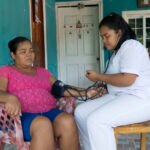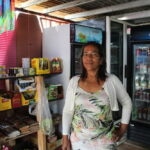Microcredits: social and health protection for less than a euro per month
The pandemic has shown the importance of having insurance to cover hospital expenses, temporary unemployment or death. These unexpected expenditures are a shock for people under vulnerable conditions and their household economy. Microinsurance are products tailored to address these needs and offer protection to low-income persons aiming to guarantee their well-being and security in the face of risks, all at affordable prices.

In 2021, the extreme poverty rate in Latin America increased up to 13.8%, which implies a 27-year setback with an estimated increase by approximately 5 million people, according to the latest annual report from the Economic Commission for Latin America and the Caribbean (ECLAC). Under these circumstances, having an insurance policy at hand with medical coverage and basic health care is available to only a few.
In the latest edition of International Labour Organization (ILO’s) Panorama Laboral de América Latina y el Caribe, regional director Vinicius Pinheiro remarked that, “the pandemic had a more severe impact due to ‘social comorbidity’ such as informality and inequality” which contributed to the loss of jobs and income, without adequate social protection framework to sustain people in a very difficult situation.”
To mitigate these situations and to offer tailored products according to their needs, BBVA Microfinance Foundation (BBVAMF), in collaboration with insurance companies, has developed policies at affordable prices, mainly for less than 1EUR monthly. These microinsurance cover from diagnosing serious illnesses such as Alzheimer or cancer, to life and disability coverage, maternity aid or medical attention for families.
Ana Jaramillo, a Panamanian entrepreneur, acknowledges that it was a surprise to have received an offer to sign up for health care insurance. In many cases, the majority of low-income people can’t even fathom having access to this kind of service. She shares, “personally, I think it’s a great initiative and very important as well, in case of illness.”

Ana Jaramillo, Panamanian entrepreneur, client of Microserfin - BBVAMF. - FMBBVA
Microserfin (BBVAMF’s Panamanian institution), in alliance with Mapfre Panamá and Corporación Continental, has recently launched a specialized cancer insurance for low-income women entrepreneurs. Most of them, like Ana, are heads of household and breadwinners, managing the homes’ resources and the only ones takingcare of the children.
“To face a cancer diagnosis or a health problem not only means higher expenses for them but also a decrease in income”, explained Edison Mejía, Microserfin’s General Manager. 88% of the Panamanian women live under vulnerable economic conditions and “our studies show that 82.7% of them don’t have any type of insurance because they can’t afford it.”
This is the case for Leysi Guaitotó Salas, another entrepreneur from Microserfin, who took out a microinsurance, and said that “it’s an excellent aid, spectacular, because cancer is something we’re all exposed to yet nobody expects it”.
Since 2021, the Panamanian BBVAMF entity also has Microsaf microinsurance, specialized in funeral assistance. This policy seeks to protect microentrepreneurs and their families against any unexpected economic shock in the event of death.
Microinsurance with a gender perspective
Vulnerability in women is higher. 59% of those who are informal workers don’t have social protection, according to the ILO. In the case of entrepreneurs supported by the BBVAMF, 56% live alone (single, separated or widowed), with dependents under their care.
This is why it’s very important to design tailored products and services for them, because their circumstances differ from those of men’s and they usually face added difficulties to access the labor market, which pushes them to start a business. Moreover, the pandemic could have delayed women’s participation in Latin America’s labor market for 10 years, according to a study by the United Nations Development Programme (UNDP).
To ease this delay, enterprising mothers need support, especially during their maternity leave. This is why Bancamía, BBVAMF’s institution in Colombia, has recently launched the MAPFRE Mi Maternidad Protegida (My protected maternity), with special coverage such as support in paying their microloans. It also includes medical and psychological assistance, women’s health promotion and prevention, medical exam interpretation and analysis, legal orientation to protect their rights by way of a petition for protection and for medical procedures, among others.

Another example is the Bolso protegido (Mi protected purse) policy, for women in catalog sales who have to go door-to-door to sell their products. For less than 1€, they can protect their goods in case of theft.
According to then executive president, Miguel Angél Charria, after five years in this institution, “Bancamía is the main microinsurance actor in Colombia with 970,000 policies brokered, where more than 610,000 are voluntary insurance, tailored to the needs of this segment, with prices starting from 4,000 pesos monthly premium (less than 1EUR)”.
The BBVA Microfinance Foundation also has a microinsurance in Chile, called Mi familia protegida (My protected family) and covers entrepreneurs in case of accidents or accidental death. Furthermore, it offers other benefits for the family. Since its creation in 2017, more than 150,000 families have already benefited from this insurance, which gives medical, pediatric, geriatric and nutritional orientation via telephone and legal orientation (civil, penal, familiar, theft, among others) via telephone as well, costing approximately 1.2USD monthly.
Medical care for all
The importance of having microinsurance tailored to low-income people’s needs is more than evident. The Pan American Health Organization (PAHO) director Carissa F. Etienne has remarked that in Latin America and the Caribbean, “248 million people still have not received a single dose of the COVID-19 vaccine, especially those who are in remote rural areas and unattended communities.”
Reality once again shows how medical care is tougher to attain in developing countries, that is why their economic situation has to be considered, as well as the payment capacity of people under vulnerable conditions, when making microinsurance services available for them.